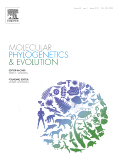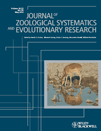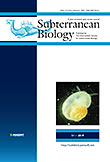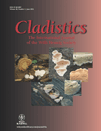
MOLECULAR PHYLOGENETICS AND EVOLUTION
Scope & Guideline
Exploring Molecular Pathways to Evolutionary Insights
Introduction
Aims and Scopes
- Molecular Phylogenetics:
The journal focuses on the use of molecular data to reconstruct phylogenetic trees, employing techniques such as DNA sequencing, RNA analysis, and genomic characterizations to elucidate evolutionary relationships. - Evolutionary Biology:
It encompasses studies that explore evolutionary processes, including speciation, hybridization, and adaptive radiation, providing insights into how species evolve over time. - Biogeography:
The journal highlights research that investigates the historical and geographical factors influencing the distribution of species, integrating phylogenetic analyses with ecological and geographical data. - Integrative Taxonomy:
A significant focus is placed on integrative approaches that combine molecular, morphological, and ecological data to resolve species boundaries and improve taxonomic classifications. - Phylogenomic Studies:
The journal publishes research that utilizes phylogenomic frameworks to understand complex evolutionary histories, including ancient gene flows and reticulate evolution.
Trending and Emerging
- Phylogenomics:
The trend towards phylogenomics is rapidly growing, with an increasing number of studies utilizing genome-wide data to resolve complex phylogenetic relationships and understand evolutionary histories. - Machine Learning Applications:
There is a rising interest in employing machine learning techniques for phylogenetic inference and species delimitation, demonstrating the journal's embrace of cutting-edge computational methods. - Integrative Approaches to Species Delimitation:
Research that combines molecular data with phenotypic, ecological, and geographical information to delineate species boundaries is gaining traction, reflecting a holistic view of biodiversity. - Hybridization and Reticulate Evolution:
Emerging themes include the study of hybridization and reticulate evolution, highlighting the complexities of evolutionary processes that involve gene flow between distinct lineages. - Environmental and Climatic Influences on Evolution:
Research focusing on how environmental changes and climatic factors influence evolutionary dynamics is becoming increasingly prominent, linking phylogenetics with ecological and conservation biology.
Declining or Waning
- Morphological Phylogenetics:
Previously, there was a stronger emphasis on traditional morphological data for phylogenetic analysis. However, the current trend leans more towards molecular data, leading to a decline in publications focusing solely on morphology. - Single Gene Analyses:
There has been a noticeable decrease in studies that rely on single-gene analyses for phylogenetic inference. Researchers now prefer multi-locus or whole-genome approaches, resulting in fewer publications centered around single-gene methodologies. - Historical Biogeography without Molecular Data:
Research focusing on historical biogeography that does not integrate molecular data has become less frequent. The trend is shifting towards studies that combine molecular phylogenetics with biogeographical insights.
Similar Journals

INSECT SYSTEMATICS & EVOLUTION
Exploring the Complexities of Insect LifeINSECT SYSTEMATICS & EVOLUTION is a prestigious journal published by BRILL, which has been a vital source of scholarly information since its inception. Specializing in the fields of ecology, evolution, behavior, and systematics within the realm of insect science, this journal garners significant attention with its 2023 ranking in the second quartile across multiple categories, highlighting its relevance and impact in the field. With a focus on advancing knowledge through innovative research and reviews, it serves as an essential platform for researchers, professionals, and students alike, promoting an understanding of insect biodiversity and systematics. The journal’s accessibility options, including its Open Access policy, combined with a broad international scope, ensure that critical findings reach a diverse audience, fostering collaboration and discourse within the scientific community. Situated in the Netherlands, INSECT SYSTEMATICS & EVOLUTION maintains its commitment to excellence and strives to contribute actively to the ongoing dialogue in insect science, making it a must-read for anyone interested in the intricate world of insects.

JOURNAL OF ZOOLOGICAL SYSTEMATICS AND EVOLUTIONARY RESEARCH
Transforming Insights into Evolutionary UnderstandingThe Journal of Zoological Systematics and Evolutionary Research, published by Wiley-Hindawi, stands as a premier academic journal since its establishment, showcasing cutting-edge research in the fields of Animal Science, Zoology, and Ecology. With an impressive track record spanning from 1963 to the present, this journal has earned a Q1 classification in both Animal Science and Ecology, as well as recognized rankings in Genetics and Molecular Biology. Its impact is highlighted by its Scopus ranks, placing it in the top percentile for relevant categories, underscoring its vital role in advancing knowledge and understanding within these disciplines. Researchers, professionals, and students will find a wealth of high-quality, peer-reviewed articles that contribute to the evolutionary understanding of biodiversity and systematics. Though not an Open Access journal, it remains accessible to a wide audience committed to exploring the intricacies of zoology and evolutionary biology.

Zoosystematics and Evolution
Connecting researchers to the pulse of evolution.Zoosystematics and Evolution is a premier peer-reviewed journal dedicated to the fields of animal science, zoology, and evolution, published by Pensoft Publishers. With a commendable Q1 ranking in multiple categories including Animal Science and Zoology, Ecology, Evolution, Behavior and Systematics, as well as Insect Science, this journal stands out as a vital resource for researchers and professionals engaged in the dynamic study of biodiversity and systematics. Since transitioning to Open Access in 2014, it has ensured that groundbreaking research is readily available to a global audience, thus fostering collaborative advancements and facilitating the dissemination of knowledge. The journal has a significant presence in both Scopus and various academic indices, enhancing its reputation and impact within the scientific community. Based in Bulgaria, at 12 Prof Georgi Zlatarski St, Sofia, the journal continues to thrive, contributing valuable insights that drive scientific inquiry and exploration in the ever-evolving realm of zoological research.

JOURNAL OF MOLECULAR EVOLUTION
Unraveling the Threads of Evolutionary BiologyThe Journal of Molecular Evolution, published by Springer, is a prestigious peer-reviewed journal dedicated to advancing the understanding of molecular evolution through high-quality research and analysis. With an impact factor establishing it as a leading authority in the field, this journal provides a vital platform for scholars focused on the intricate relationships between molecular biology and evolutionary processes. Featuring a Q1 ranking in Ecology, Evolution, Behavior and Systematics, and significant rankings in Genetics and Molecular Biology, the journal has consistently positioned itself at the forefront of academic discourse since its inception in 1971. Notably, the journal boasts an extensive archive that converges from 1971 to 2024, providing a comprehensive resource for current and future research. Although it operates on a subscription model, the high caliber of contributions ensures that it remains an essential reference point for researchers, professionals, and advanced students eager to deepen their understanding of molecular mechanisms and evolutionary dynamics.

Subterranean Biology
Bridging the Gap Between Surface and Subsurface EcologySubterranean Biology is a premier open-access journal published by the International Society of Subterranean Biology, dedicated to advancing knowledge in the field of subterranean ecosystems. With an impact factor that reflects its significance in the academic community, this journal has achieved a commendable ranking of Q1 in Animal Science and Zoology and Q2 in multiple categories including Ecology, Evolution, Behavior and Systematics, Nature and Landscape Conservation, and Soil Science, based on its 2023 category quartiles. Located in Bulgaria and affiliated with the Department of Animal Biology at the University of Rome, the journal has been fostering open scientific discourse and accessibility since 2011. With its ISSN 1768-1448 and E-ISSN 1314-2615, it aims to provide a platform for researchers and students to explore the complexities of subterranean life forms and their ecological implications. By publishing a wide range of research articles, reviews, and case studies, Subterranean Biology empowers its readers to delve deeper into the hidden realms of our natural world.

CLADISTICS
Connecting Researchers through Rigorous Scientific InquiryCLADISTICS is a premier academic journal published by WILEY, dedicated to advancing the fields of ecology, evolution, behavior, and systematics since its inception in 1985. Renowned for its rigorous peer-review process and commitment to high-quality research, the journal is listed in the top quartile (Q1) of its category as of 2023, ranking 50th out of 721 journals in the Scopus database, placing it in the 93rd percentile. This significant standing underscores its critical role in the dissemination of pioneering research and methodologies that are shaping modern evolutionary biology. With a focus on clade-based phylogenetic studies and their applications, *CLADISTICS* serves as a vital resource for researchers, professionals, and students alike, fostering a deeper understanding of biodiversity and evolutionary processes. Although it does not offer open access, the journal is committed to providing comprehensive, state-of-the-art content that continues to influence the scientific community and guide future research directions.

Evolutionary Bioinformatics
Exploring the dynamic landscape of evolutionary bioinformatics.Evolutionary Bioinformatics, published by SAGE Publications Ltd, is a pioneering open-access journal established in 2005, dedicated to advancing the field of evolutionary biology through innovative computational techniques and bioinformatics. With an ISSN of 1176-9343, it serves as a critical platform for researchers, professionals, and students to disseminate impactful findings and foster collaboration across disciplines. The journal spans a broad scope, contributing significantly to the areas of Ecology, Evolution, Behavior and Systematics, and Genetics, as evidenced by its respectable Scopus rankings and quartile placements in 2023. With a commitment to providing comprehensive, peer-reviewed research articles and tools for sharing knowledge, Evolutionary Bioinformatics plays an essential role in shaping the future of evolutionary studies and bioinformatics. Readers and contributors alike are encouraged to engage with cutting-edge research that pushes the boundaries of understanding in this dynamic field.

Molecular Ecology Resources
Unraveling Nature's Secrets Through Molecular InsightsMolecular Ecology Resources, published by WILEY, is a leading international journal that specializes in the intersection of molecular biology with ecology and evolution. With an impressive impact factor signified by its Q1 status in multiple categories, including Biotechnology, Ecology, Evolution, Behavior and Systematics, and Genetics for 2023, this journal stands as a reputable source of groundbreaking research within the fields of agricultural and biological sciences. Its Scopus rankings are particularly noteworthy, placing it in the top tier of its respective categories, demonstrating its significance in advancing our understanding of molecular ecology. The journal has been committed to fostering high-quality scientific discourse from 2008 to 2024 and offers open access options to enhance its visibility and accessibility. As a researcher, professional, or student in these dynamic fields, engaging with Molecular Ecology Resources means contributing to and staying informed about the latest innovations and methodologies that shape our understanding of the biological world.

ORGANISMS DIVERSITY & EVOLUTION
Fostering Insights: Bridging Ecology, Behavior, and SystematicsOrganisms Diversity & Evolution is a premier academic journal published by Springer Heidelberg, dedicated to advancing the fields of ecology, evolution, behavior, and systematics. Established in 2001 and continuing through 2024, this journal plays a crucial role in disseminating high-quality research that explores the complexities of biological diversity and evolutionary processes. With a commendable 2023 Scopus ranking of #253/721 in its category, placing it in the 64th percentile, and categorized in the Q2 quartile for Ecology and Evolution, it consistently attracts contributions from leading scientists and researchers worldwide. Although it operates on a subscription basis, the journal's rigorous peer-review process and dedication to impactful scientific discourse make it an invaluable resource for academics, practitioners, and students keen on understanding the intricate relationships that shape our biodiversity. By highlighting innovative research and fostering discussions on urgent ecological challenges, Organisms Diversity & Evolution serves as a vital platform for those committed to conservation and evolutionary biology.

BULLETIN OF THE AMERICAN MUSEUM OF NATURAL HISTORY
Exploring the depths of agricultural and biological sciences.BULLETIN OF THE AMERICAN MUSEUM OF NATURAL HISTORY, published by the American Museum of Natural History, represents a cornerstone of scholarly communication in the fields of Agricultural and Biological Sciences and Ecology. With an impressive impact factor highlighted by its Q1 quartile rankings in both categories, the journal publishes high-quality, peer-reviewed research that significantly contributes to the understanding of natural history. Researchers will find this journal indispensable as it covers a diverse range of topics, providing insights that drive ecological research and biological discovery forward. Although not open access, the Bulletin is widely available through institutional subscriptions, making it accessible to both established professionals and students eager to stay informed about the latest advancements in the field. Its commitment to advancing knowledge from 1996 to the present ensures that it remains relevant and highly regarded within the scientific community.